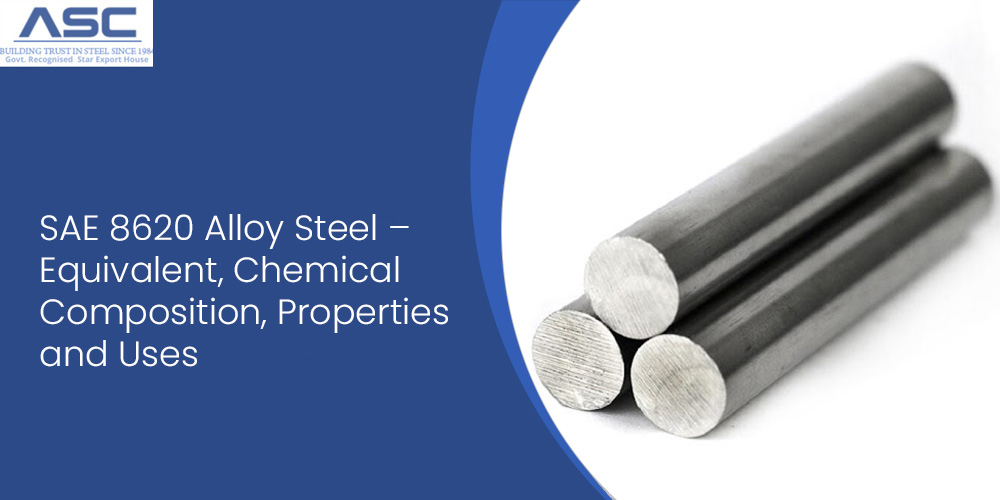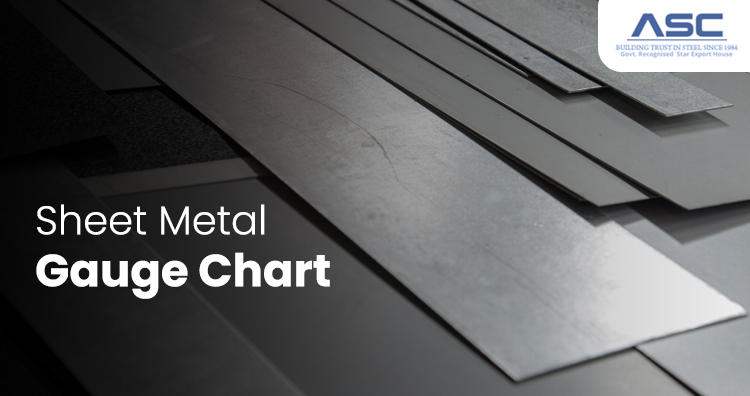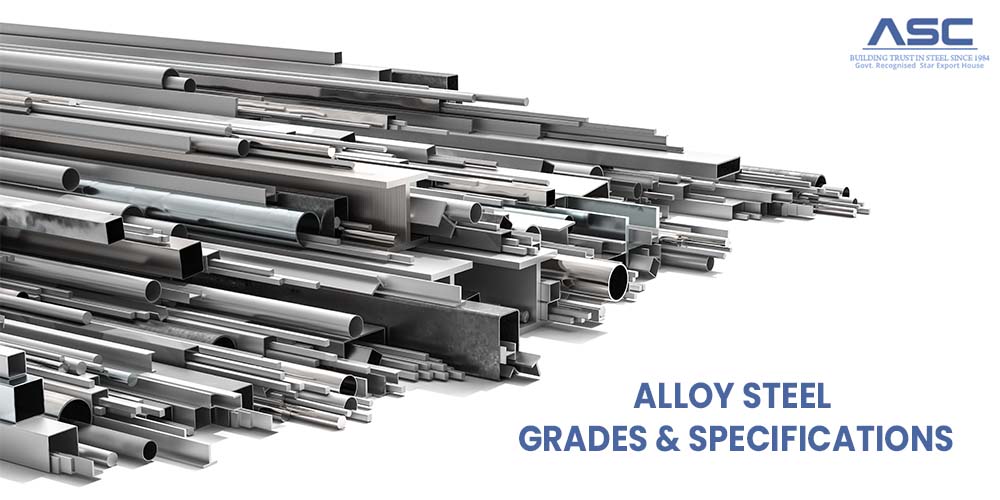SAE 8620 Alloy Steel (UNS G86200) - Properties & Composition
by AMC
Posted on November 25, 2023 at 12:57 PM

AISI 8620 Alloy Steel, a notable low alloy nickel, chromium, and molybdenum case-hardening steel, is
typically delivered in the as-rolled condition with a maximum hardness of HB 255. Renowned for its exceptional
external strength and commendable internal durability, SAE 8620 steel stands out as a highly wear-resistant
material. Notably, it exhibits a superior core strength when compared to grades 8615 and 8617.
One of the distinctive features of SAE 8620 alloy steel lies in its flexibility during hardening treatments.
This characteristic enables the enhancement of case/core properties, contributing to its overall robustness.
In its pre-hardened and tempered (uncarburized) state, 8620 steel opens avenues for further surface hardening
through nitriding. However, it's important to note that it does not respond satisfactorily to flame or
induction hardening due to its lower carbon content.
SAE 8620 alloy steel finds particular suitability in applications demanding a harmonious blend of toughness
and wear resistance. Commonly available in round bar form, this grade of steel caters to a wide range of
industrial needs, offering a reliable combination of strength and durability.
SAE 8620 alloy steel Equilvalents Chemical Composition
| Standard | Grade | C | Mn | P | S | Si | Ni | Cr | Mo |
|---|---|---|---|---|---|---|---|---|---|
| ASTM A29 | 8620 | 0.18-0.23 | 0.7-0.9 | 0.035 | 0.040 | 0.15-0.35 | 0.4-0.7 | 0.4-0.6 | 0.15-0.25 |
| DIN 1654 | 1.6523/ 21NiCrMo2 |
0.17-0.23 | 0.65-0.95 | 0.035 | 0.035 | ≦0.40 | 0.4-0.7 | 0.4-0.7 | 0.15-0.25 |
| EN 10084 | 1.6523/ 20NiCrMo2-2 |
0.17-0.23 | 0.65-0.95 | 0.025 | 0.035 | ≦0.40 | 0.4-0.7 | 0.35-0.70 | 0.15-0.25 |
| JIS G4103 | SNCM220 | 0.17-0.23 | 0.6-0.9 | 0.030 | 0.030 | 0.15-0.35 | 0.4-0.7 | 0.4-0.65 | 0.15-0.3 |
| BS 970 | 805M20 | 0.17-0.23 | 0.6-0.95 | 0.040 | 0.050 | 0.1-0.4 | 0.35-0.75 | 0.35-0.65 | 0.15-0.25 |
AISI 8620 alloy steel physical properties
| Properties | Metric | Imperial |
|---|---|---|
| Density | 7.85 g/cm3 | 0.284 lb/in³ |
SAE 8620 alloy steel mechanical properties
| Properties | Metric | Imperial |
|---|---|---|
| Tensile strength | 530 MPa | 76900 psi |
| Yield strength | 385 MPa | 55800 psi |
| Elastic modulus | 190-210 GPa | 27557-30458 ksi |
| Bulk modulus (typical for steel) | 140 GPa | 20300 ksi |
| Shear modulus (typical for steel) | 80 GPa | 11600 ksi |
| Poisson’s ratio | 0.27-0.30 | 0.27-0.30 |
| Izod Impact | 115 J | 84.8 ft.lb |
| Hardness, Brinell | 149 | 149 |
| Hardness, Knoop (converted from Brinell hardness) | 169 | 169 |
| Hardness, Rockwell B (converted from Brinell hardness) | 80 | 80 |
| Hardness, Vickers (converted from Brinell hardness) | 155 | 155 |
| Machinability (hot rolled and cold drawn, based on 100 machinability for AISI 1212 steel) | 65 | 65 |
8620 alloy steel thermal properties
| Properties | Metric | Imperial |
|---|---|---|
| Thermal conductivity | 46.6 W/mK | 323 BTU in/hr.ft².°F |
Versatile Applications of AISI 8620 Steel:
SAE 8620 steel is highly sought after for its versatility, finding application in various medium-strength scenarios where a combination of durability and resilience is paramount. Some noteworthy applications include:
- Camshafts: The robust nature of AISI 8620 makes it an excellent choice for manufacturing camshafts, a critical component in internal combustion engines. Its superior strength and wear resistance ensure reliable performance in demanding automotive environments.
- Camshafts: In the realm of fasteners, AISI 8620 stands out for its ability to withstand moderate loads and provide secure connections. Whether in industrial machinery or construction, its dependable properties make it an ideal material for bolts, screws, and other fastening components.
- Gears: Gears operate under challenging conditions, requiring materials with exceptional strength and wear resistance. AISI 8620 steel's high external strength and good internal strength make it a preferred choice for manufacturing gears, ensuring smooth and reliable power transmission. Chains/Chain Pins:
- Chains/Chain Pins: Chains and chain pins demand materials that can endure repetitive stress and maintain structural integrity. AISI 8620's wear-resistant properties and high core strength make it well-suited for applications involving chains, where durability and resistance to deformation are crucial.
Conclusion:
In summary, the exploration of AISI 8620 Alloy Steel (UNS G86200) has illuminated a material of remarkable strength and adaptability. From its low alloy composition with nickel, chromium, and molybdenum to its as-rolled state, boasting a maximum hardness of HB 255, AISI 8620 stands out as a formidable force. Demonstrating high external strength and robust internal properties, it finds a pivotal role in various medium-strength applications, including camshafts, fasteners, gears, and chains/chain pins. The alloy's flexibility during hardening treatments allows for the enhancement of core properties, offering a unique balance of toughness and wear resistance. Whether pre-hardened and tempered or surface-hardened through nitriding, AISI 8620 proves its mettle across diverse industrial landscapes. Available commonly in round bar form, this alloy emerges as a reliable choice, embodying the essence of durability and resilience in engineering applications. AISI 8620 Alloy Steel is undeniably a cornerstone in the pursuit of strength and reliability in medium-strength scenarios.

Sheet Metal Gauge Chart
When working with sheet metal, the term "gauge" is commonly used to describe the thickness or thickness range of the material.

